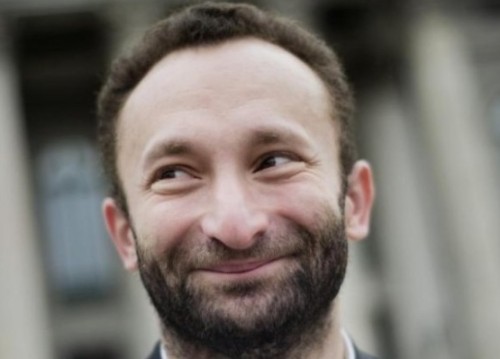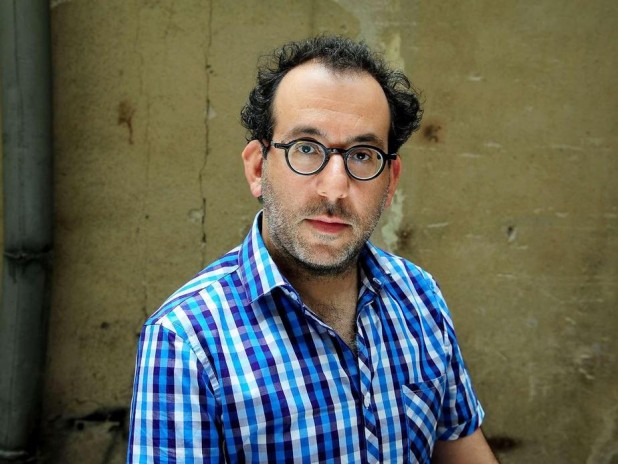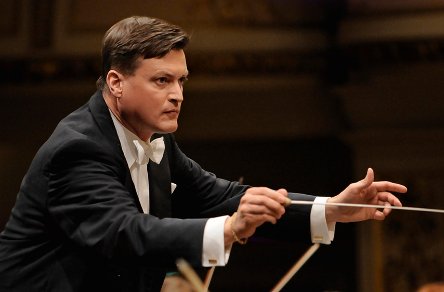Andrew Joyce
Occidental Observer
September 27, 2015

This month marks the 165th anniversary of the publication of Richard Wagner’s landmark essay ‘Das Judenthum in der Musik.’ Almost right on cue the opera scene, particularly in Berlin, has recently played host to a series of episodes that would have the Old Sorcerer spinning in his grave. Back in June Kirill Petrenko, a Siberian-born Jewish conductor, was appointed as music director to the Berlin Philharmonic beginning September 2018. Petrenko was no-one’s first choice. His name apparently came into the reckoning only after 124 orchestra members split down the middle in an all-day election on May 11, half of them voting for the German favourite Christian Thielemann and the other half for the young Latvian, Andris Nelsons. By nightfall, the players were steeped in conflict, forcing leaders to seek a third, compromise candidate. Petrenko, 43, in his second year as music director at Bavarian State Opera, privately signalled his disinterest in the job. However, when called with the election result, he accepted with ‘euphoria and joy’. As a result, he will be the first Jewish chief conductor of the Philharmonic.
Rather predictably, Petrenko’s appointment has been greeted with enthusiasm by Jewish critics and commentators eager to indulge in the usual effort to promote their co-ethnics as geniuses. In my 2013 analysis of the Spinoza cult, I pointed out that
a recurring theme here at TOO has been the monitoring of ethnic networking in efforts to establish Jewish figures in positions of scientific, academic, artistic or cultural pre-eminence. Erudite studies by several writers, particularly Kevin Macdonald (a major theme of The Culture of Critique) and Brenton Sanderson, have shed light on individual cases (e.g., Boas, Freud, Trotsky, Rothko, Mahler) as well as the more generic processes involved in these efforts (e.g., promotion in the elite media and the academic world). Typically these efforts can be said to begin with the veneration by a group of Jews of a Jewish intellectual or artist, and is followed by the creation of an authoritarian cult-like aura around his or her personality. The process reaches its completion, in some cases after the death of the guru figure, in an aggressive Jewish marketing effort to convince society at large that this figure, together with his or her ideas, is or was of national or international—if not cosmic—significance. It is predominantly by this process that the notion of “Jewish Genius” is perpetuated.
More specifically relevant to the Petrenko case, in 2011 TOO’s Brenton Sanderson wrote ‘Why Mahler? Norman Lebrecht and the Construction of Jewish Genius.’ The piece explored the efforts of Jewish critic and author Norman Lebrecht to transform Mahler’s image “from that of a relatively minor figure in the history of classical music at mid-Twentieth Century, into the cultural icon of today.” Sanderson, commenting on Lebrecht’s Why Mahler?, writes that
The focus here is on alerting us to fact of Mahler’s towering genius, and how this genius was inextricably bound up with his identity as a Jew. Overlaying this, as ever, is the lachrymose vision of Mahler the saintly Jewish victim of gentile injustice. Lebrecht’s new book is another reminder of how Jewish intellectuals have used their privileged status as self-appointed gatekeepers of Western culture to advance their group interests through the way they conceptualize the respective artistic achievements of Jews and Europeans.
Given Sanderson’s comprehensive treatment of Lebrecht and his motivations, and the wider context of Jewish ethnic networking, I was unsurprised to see Lebrecht emerge as one of Petrenko’s earliest and most gushing admirers in the aftermath of the diminutive Jew’s election. According to Lebrecht, Petrenko is a “profound and experienced Wagnerian,” who “spares nothing in his musical passions and gives both musicians and audience the feeling that the music could not be performed in any other way.” Lebrecht assures us that Petrenko is “a genuine maestro.”
Next to Christian Thielemann, however, Petrenko cuts a far from impressive figure. By Lebrecht’s own admission Petrenko “is completely unknown abroad, in the territories where the Berlin Phil needs to be number one. A few guest appearances at the Metropolitan Opera, Covent Garden and the Concertgebouw left no lasting impression. He has never toured Japan or China. He has made hardly any recordings.” By contrast, Thielemann is a titan in Wagnerian circles in particular. Thielemann is a regular conductor at the Bayreuth, following his début in 2000 with Wagner’s Die Meistersinger von Nürnberg, and the Salzburg Festivals. In 2003, he was awarded the Order of Merit of the Federal Republic of Germany (Bundesverdienstkreuz). In October 2011, he received honorary membership of the Royal Academy of Music in London, and in 2015 Thielemann won the Richard Wagner Award (Richard-Wagner-Preis) of Leipzig. A few months ago, the Bayreuth Festival formally announced the appointment of Thielemann as its music director.
The ‘problem’ with Christian Thielemann has nothing to do with his talent in the pit, and everything to do with his alleged political and cultural beliefs. Particularly harmful has been the lurking accusation that in 2000 he made negative comments about Jewish conductors in the Berlin music scene. Berlin has one of the fastest growing Jewish populations in the world, and many of its cultural avenues have been falling into Jewish hands at an equally rapid pace. Australian-born Barrie Kosky is one of several Jewish artists heading Berlin’s cultural institutions. As general manager of the Komische Oper, Kosky joins Daniel Barenboim (Berlin Staatsoper), Ivan Fischer (Konzerthaus) and the incoming Kirill Petrenko. Kosky welcomes the growing Jewish monopoly of Berlin culture: “I say the more Jews the better in Berlin — bring it on! If you look at Berlin before the war, all the theatres were owned by Jews, it was like Broadway. They say that half the orchestras were full of Jewish musicians, all the major theatre directors were Jews.”

The growing Jewish monopoly over German theatre and music has often come at the expense of taste, talent and decency. Kosky’s own repertoire includes a production of Rameau’s Castor and Pollux at the English National Opera that featured masturbation, transvestism, and the copious nudity of obese women. Rather typically, this onslaught on a European classic was praised by the Jewish critic David Karlin, who wrote that Kosky’s perversion “breathed new life” into it.
Against this backdrop of Jewish-inspired filth, in October 2000 a letter appeared in the Frankfurter Allgemeine Zeitung, written by a former Berlin culture official named Ulrich Roloff-Momin. Roloff-Momin reported in passing that a “leading Berliner” — whom he did not name — had been heard to say how happy he was, “now that the Jewish mucking about in Berlin will be over.” The comment has been alternatively translated as “looking forward to an end to the Jewish mess.” Roloff-Momin was hinting, or the “leading Berliner” was hinting at the anticipated departure of Daniel Barenboim from his position as musical director of the Staatsoper, the Berlin State Opera, when his contract lapsed in the summer of 2002 (in the end Barenboim did not leave Berlin). Although Roloff-Momin refused to state the identity of the “leading Berliner,” Christian Thielemann was largely touted as almost certainly being the man behind the comment.

Thielemann denied any involvement, calling such accusations “ridiculous’” and suggesting they had been orchestrated to damage his reputation at a tense and confrontational time for Berlin opera. “It is very strange that something like this comes up now,” he said. However, Thielemann has since attracted further scorn from Jews and other cultural Marxists for his cultural conservatism, his barely-concealed nationalism, and his veiled expression of support for the PEGIDA movement in January 2015. Most notably, Thielemann has raised the ire of Norman Lebrecht, who combines a sycophancy for his Jewish subjects with an open and sarcastic disdain for the traditional approach of Thielemann. Lebrecht writes:
The German of 2015 — hailed by some as a man of destiny — is Christian Thielemann, Berlin born and bred, German as bratwurst in a bierkeller. German, and then some. Thielemann, 56, is a musical conservative who shuns atonality and pretty much anything written after the death of Richard Strauss. His outlook is resolutely retro. He likes saying that Germans have nothing to apologize for, a coded phrase that places him on the outer fringe of the democratic right. In January, he issued a diatribe that appeared to show support for the Pegida anti-immigrant movement. A loner, never married, aloof and uncollegial, Thielemann is a powerful if conventional interpreter of Beethoven, Brahms and Bruckner.
Sly insinuations that Thielemann’s repertoire is somehow parochial and unadventurous (i.e. he doesn’t entertain the work of Jewish composers) have provoked the Berliner to defend himself by arguing that: “If you had a Russian conductor and he conducted Russian works, you wouldn’t say a word. Why do people say a word when a German conductor conducts German works?” His refusal to apologize for sticking with German music goes hand in hand with his refusal to apologize for the German past: “I try to value things,” he says. “Never has everything been wrong. There are some very dark points; there are some very good points.” For Thielemann, politics has no place in music. He has been criticized for resurrecting Hans Pfitzner’s Palestrina by those who argue that Pfitzner’s nationalist sympathies and statements about Jews put him beyond the pale. But Thielemann argues that if music is good, the moral character or political affiliation of the composer is irrelevant. “When I first conducted Palestrina in Nuremberg, someone said, ‘This is a nationalistic piece of shit.’ This score, this beautiful, beautiful piece. What has C sharp minor to do with fascism? Nothing.”
Michael Henderson has written that in liberal Berlin there is no room for a cultural conservative like Thielemann, “a man who keeps a bust of Frederick the Great on his desk.” Henderson continues:
There is unease that the conductor’s job should go to a man who has expressed conservative, some would argue reactionary, opinions. He is not, as some have claimed, a neo-Nazi. Such talk is foolish. But the man who keeps a bust of Frederick the Great on his desk is an old-fashioned Prussian of robust views, and many modern Prussians do not share them. When Thielemann gave an interview earlier this year, in which he expressed sympathy if not outright support for Pegida, the anti-immigrant movement based in Dresden, Berliners were appalled. The orchestra immediately placed a poster on the tower of their concert hall, the Philharmonie, which read: “One orchestra, four religions, 124 musicians.”
What Thielemann had in fact stated back in January was simply his earnest belief that “we must finally listen to the questions confronted by the PEGIDA phenomenon.” Regardless of the equivocal nature of Thielemann’s full statement on the PEGIDA movement, it was apparent by May 2015 that he would be denied the advancement his talent demanded purely on political grounds. Or, as Lebrecht put it, “only his penchant for reported rightwing indiscretions can stem his vertical progress.” Against this background, it is difficult to see the election of Kirill Petrenko at the Berlin Philharmonic as anything other than a misguided act of defiance by a clique of left-liberal musicians. What better way to thumb their noses at the conservative Thielemann, than to elect an obscure and mediocre Jew?
Not everyone extended such a warm welcome to the Siberian Hebrew. Sabine Lange of Northern German Broadcasting [NDR Kultur] stated that Thielemann was well-versed in the German sound but that Petrenko was a mere “tiny gnome, the Jewish caricature.” Manuel Brug, a Welt Online commentator made the faux pas of pointing out that the three best conducting positions in Berlin were all now occupied by Jews. Even though numerous Jewish media outlets had made the same point, Brug was a non-Jew, and therefore stating such a fact was, according to Norman Lebrecht “unhelpful and unnecessary.” Brug came in for even heavier criticism for stating that it was “a relief to many” that Petrenko enjoys good interpersonal relations, “as at least one of the female opera singers at this year’s Bayreuth [Wagner] Festival can attest.” This was interpreted as playing upon “the anti-Semitic stereotypes of overly competitive and oversexed Jews.”
Observing this episode and its context, I couldn’t help but reflect on Wagner’s timeless Jewry in Music. After 165 years, the remarkable clarity of its insight retains almost startling relevance. The ascendance of mediocre, if not trashy, Jewish “talent” to the heights of Berlin’s cultural scene was predicted by Wagner who commented:
The Jew, who is innately incapable of presenting himself to us artistically through either his outward appearance or his speech, and least of all through his singing, has nevertheless been able in the widest-spread of modern art-varieties, to wit in music, to reach the rulership of public taste.
Of course, once this rulership has been achieved, we swiftly begin to witness the degradation of European art. Barrie Kosky’s obscene barbarism should be seen as merely the tip of the iceberg in this respect. Even in 1850 Wagner noted the tendency of Jewish “artists” to degrade and cheapen the European cultural heritage, arguing that “we have no need to first substantiate the be-Jewing of modern art; it springs to the eye, and thrusts upon the senses, of itself.”
The gut-reaction of Sabine Lange to the extreme physical dissonance between the 6ft 3in Thielemann and the 5ft 3in Petrenko is also explained by Wagner, who wrote that “the Jew in ordinary life strikes us primarily by his outward appearance, which, no matter to what European nationality we belong, has something disagreeably foreign to that nationality; instinctively we wish to have nothing in common with a man who looks like that.” Contrasted with Thielemann, Petrenko’s foreign, non-European appearance is merely accentuated to an almost comic degree — becoming, as Lange correctly pointed out, a Jewish caricature. Wagner also had prescient comments to make about the likes of Norman Lebrecht and his ilk. These conceited, arrogant, but ultimately blind Jewish intellectuals “stand alien and apathetic in a society they do not understand, with whose tastes and aspirations they do not sympathize, whose history and evolution have always been indifferent to them.”
To conclude, I might add that as well as assaulting the European musical tradition, Jews have used their “rulership” to ensure opera becomes yet another cultural avenue in which criticism of Jews is taboo. One of the most recent victims of the Jewish rulership is John Adams’s The Death of Klinghoffer. First produced in New York in 1991, the opera is based on the hijacking of the passenger liner Achille Lauro by the Palestine Liberation Front in 1985, and the hijackers’ murder of 69-year-old Jewish passenger Leon Klinghoffer. The opera has drawn heavy criticism from Jews, including Klinghoffer’s two daughters, that the opera is anti-Semitic and glorifies terrorism. The primary reason for these accusations is that the creators of the opera attempted to give equal voice to both Palestinian and Israeli voices with respect to the political background to the hijacking. But as we well know, Jews are never content with equality, but only special treatment and protections. The dramatic expression of Palestinian historical grievances in a theatrical context was thus construed by organized Jewry as an expression of sympathy with Palestinian terrorism.
Jews also accused the opera’s creators of anti-Semitism for their portrayal of fictional Jewish-American neighbours of the Klinghoffers, the Rumors, in a scene in the original version. The couple were characterized in a way that organized Jewry deemed to be offensive and “inappropriately satirical.” It was alleged that the scenes involving the Rumors portrayed Jews as self-absorbed, gossiping, bargain-hunting bourgeois materialists without souls. Far from being exaggerated caricatures of the modern Jewish family in America, the scene was actually devastatingly perceptive and accurate as a sociological study of modern Jewish identity. Even Jewish music critic Robert Fink conceded that this portrayal of American Jews was offensive and upsetting to Jewish audiences because it was “akin to standing culturally naked in front of an unflattering music-dramatic mirror. American Jews did not like what they saw.” Regardless of the accuracy of this reflection, the howling Jewish furore that followed the American premiere forced Adams to delete this scene in its entirety while revising his opera for all future productions.
The opera has since had a difficult history. In June 2014, the Metropolitan Opera in New York cancelled an international simulcast and radio broadcast due to “an outpouring of concern” that it “might be used to fan global anti-Semitism.” This ridiculous argument was made by the ADL. Abraham Foxman whined: “While I haven’t personally seen the opera, numerous experts on anti-Semitism and the Arab-Israeli conflict on the ADL staff have, and our objections are based on their analyses and a full reading of the libretto.” In addition to cancelling both broadcasts, the MET agreed to include a statement from Klinghoffer’s daughters in the printed program. Shortly afterwards, the production was also dropped by the Los Angeles Opera. Jewish groups continue to harass anyone attempting to stage it.
In 1869 Richard Wagner published an additional essay which acted as an extension to ‘Jewry in Music.’ At the conclusion of that piece, he wrote:
Whether the decadence of our culture can be prevented by forcible expulsion of foreign elements of pernicious character I cannot say; as powers for this purpose are requisite, of the existence of which I am not aware.
As with his earlier statements, nearly 150 years later not much has changed
 Daily Stormer The Most Censored Publication in History
Daily Stormer The Most Censored Publication in History


